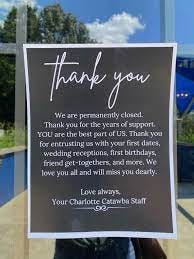“Hey, what’s up?” I asked the brewery CEO when he called me in the middle of the day. I was working from home that day, a little less than three months into a job created specifically for me, a bespoke position I created with the CEO to figure out how we could fit me into the brewery.
“I was hoping you were going to be in today,” he responded. “Because I need to talk to you.”
He went on to tell me that I was being laid off along with 30% of the workforce. I listened in shock as I stared at the training PowerPoint I was in the middle of creating for our team.
“We’ve lost over $200,000.00 in the last month alone,” he sobbed. “I have to fire a bunch of people.”
“A bunch of people” included myself and two employees he had hired in the past two weeks. The past two weeks, as in two of the weeks wherein the company lost $200,000.00. Why had he hired them then? Why had he hired me? At least one of the new hires now getting fired had left their previous job for the role they were now being fired from. Also, this call was coming in the middle of the week because he and his wife had been on vacation for the previous several days.
At the time, this was a somewhat novel situation in the brewing industry. Now, over two years, stories like this have become quotidian. People get called into an unscheduled meeting to be told that they have X amount of days remaining before their brewery scales back, closes a location, or shuts down completely. How many times this year have we heard of employees learning that they were out of a job from social media or - possibly the most despicable and cowardly of all - arriving to work to find the door padlocked or a sign taped to the door saying the business is closed?
I had originally selected this newsletter’s topic because it resonated with me and how I got into the beer industry. As I thought about it more, however, I realized that the topic may be more helpful and applicable to those leaving the industry for a myriad of reasons - toxicity, lack of upward mobility, low pay, hazardous work environments, and suddenly finding ourselves laid off, scaled back, unceremoniously drummed out of jobs.
No one likes doing it, but if you’re in the beer industry right now - you need to update your resume. Your job is not secure.
If you are interested in moving into the beer industry, that’s cool, too. This content still applies to you and I truly don’t mean to dissuade anyone from pursuing a career in beer.1
A friend sent me this article about workforce development in STEM being reimagined as a braided river and it has resonated with me ever since, particularly because the concept was more or less what I followed when I moved from the legal industry to the beer industry. In short, the braided river model recognizes all the different ways a person’s life experiences can qualify them for a position, even - especially - when they don’t neatly fit into the pipeline model, i.e. high school diploma, college degree, possibly advanced degrees, and long tenures in similar jobs. The braided river model accounts for transferable skills and addresses potential barriers that may be challenging for non-pipeline applicants to overcome.
As the article elaborates, a pipeline has one entry point and, if you miss it, you may not be able to enter the pipeline. On the other hand, a braided river model eliminates the formal infrastructure and instead allows multiple entry points.
I am no stranger to internally challenging job postings and encouraging managers to rethink and reprioritize what they actually need in an employee rather than reusing a copied and pasted job description that contains a lot of bullshit not required by a job.2 However, there is a plethora of information out there for writing equitable job posts, etc., and I’m really not about doing free labor for people who can afford to pay for that kind of expertise.
Please know that I’m not writing this to freak anyone out. I know that many of us feel our jobs and our industry are precarious right now. This time of year is slow for a lot of us in the industry, so why not encourage ourselves and each other to revisit our resumes?
Best case scenario - nothing arises in the coming months that makes us suddenly need a resume to avoid a gap in our income. If that’s the case, great! Then you’ve spent some time organizing all of your hard-earned experience and can reflect on how much you’ve accomplished.
Worst case scenario - you get a call like I did or attend an end-of-day company meeting wherein you’re told your employment days are numbered. That’s extremely stressful and shitty. While I hope that no one reading this has to experience this (or re-experience it, as has happened to a handful of friends), realistically, someone(s) will. The people who worked at the over 400 breweries in the US that closed last year experienced it.
Yes, updating a resume can be tedious. Yes, cover letters are SO STUPID AND WHY DO WE EVEN HAVE TO WRITE THEM STILL. Yes, it’s time-consuming to tAiLOr your resume for different jobs.
But let’s reframe resume updating. As I mentioned above, updating your resume allows you to reflect on everything you do at your job and see the progression your work life has taken. If that’s a little too abstract for you, then consider that updating your resume now can also mean two things:
If you find yourself suddenly without a job, you will not have the additional stress of needing to update your resume while also dealing with the trauma of losing a job.
Having an updated resume means that if you decide you want to voluntarily leave your current job, you’ve already got a resume ready to send out.
It may sound a little silly to say that updating your resume when you don’t need to is a confidence builder, but it is. Job hunting is fucking exhausting and often all for naught. But how often have you (the royal “you” - I’m including myself here) decided not to look for jobs or not to apply for jobs because …you haven’t updated your resume? Now imagine having a bad day at work, one of those “this time I’ve had it” days, and then you remember that you already have an updated resume begging to be sent somewhere better. Or someone reaches out to say “Hey, are you still looking for something different? Send your resume to my friend, they’re hiring.”
I won’t belabor this point much longer. You don’t have to update it all at once. Chances are most of the information on your resume hasn’t changed, such as your past job experience and education. If it’s too daunting to update all at once, use the Pomodoro method or dedicate yourself to updating one chunk at a time.
Back to the braided river model, don’t count yourself out of jobs in new industries or even new roles within the beer industry. If there’s a different type of role in which you’re interested, look at job descriptions and postings for that role to see what transferable skills you have and what gaps you may be able to address with continuing education or other experiential opportunities.3 Project management, attention to detail, developing SOPs and recipes, and being adaptable in high-pressure situations are all common transferable skills within the industry that can easily be applied to another industry.
Don’t meet 100% of the job qualifications? Who cares, apply anyway. If I waited until I felt confident that I met all of the qualifications for a job, I never would have applied for the first industry job I got. Or the second, for that matter.
Yes, your resume can be more than one page long. Two (full) pages are fine. Formatting is your friend to make everything fit neatly. Don’t waste space including references or saying references are available upon request - employers know that. Use that valuable real estate for listing everything you can bring to the table. Yes, it’s tedious, but I tweak my resume for every job based on the job posting - the bones of your resume stay the same but maybe this position calls for more customer-facing tasks whereas another position calls for more administrative experience.
Need more motivation? Consider asking your friends and coworkers (lulz) if they’d like to have a resume party or at least set up an email chain of resume exchanges and reviews. I lowkey love reviewing resumes in part because I learn so much more biographical information about people from reading their resumes - like would you have guessed that I got my undergraduate degree from the University of South Alabama? Not likely, unless you’ve read my resume. Or this newsletter now, I guess.
Harkening back to an earlier newsletter, when faced with a difficult problem you cannot solve, then there is an easier problem you can solve - find that problem and solve it.
I don’t know what the coming year is going to look like for the industry, but it’s going to be hard and it’s going to be hard for reasons beyond my control. The easier problem I can solve is to encourage all of us to control the parameters we can, and one of those is updating your resume before you have to.
Off the Grid
Hello, it’s a rare non-beer sensory story for you. The much-maligned Court of Master Sommeliers of America (CMS-A) has done a Good Thing. Beginning in 2024, the CMS-A will no longer use the terms “Old World” and “New World” in their educational courses and examination grids.
Why is this a Good Thing? Because Europe is not “Old World" and the rest of the world is definitely not “New World.” According to the announcement,4 the CMS-A made this decision based on “the commitment to uphold historical accuracy, eliminate cultural bias, and acknowledge the growing challenge of distinguishing between ‘Old World’ and ‘New World’ wines.”
If you’ve been around me for more than 5 minutes, you have probably heard me discuss the flaws of sensory language and how it is still very much centered around the lived experiences of a very small, very homogenous group of people, i.e. middle-aged, middle- to upper-income bracket, white, cis-gender, heterosexual men of European descent. The “Old World” and “New World” narrative upholds the colonizer notion that non-European lands, people, and cultures were “discovered” when they very much were not. It also centers the creation of winemaking in Europe which was then introduced to other areas of the world - also untrue.5
There are still a lot of improvements that can be made in sensory language, but this is a good start. I wish the CMS-A would have elaborated a bit on why they see this language change helping “eliminate cultural bias” because the why behind the how is often far more telling - do you actually care about and believe in the changes you are making or are you picking low-hanging fruit for quick “diversity” wins without truly appreciating why people were asking for the change?
2023 Book Faves
It’s no secret that I love books and I love reading - those are two separate hobbies, by the way, and don’t believe anyone who tells you differently. In lieu of telling you what I’m up to these days (not much, tbh), I thought I’d share my top 10 favorite books I’ve read this year:6
How to Taste: A Guide to Discovering Flavor and Savoring Life by Mandy Naglich
Wordslut: A Feminist Guide to Taking Back the English Language by Amanda Montell
Girly Drinks: A World History of Women and Alcohol by Mallory O’Meara
Life in Five Senses: How Exploring the Senses Got Me Out of My Head and Into the World by Gretchen Rubin
How We Show Up: Reclaiming Family, Friendship, and Community by Mia Birdsong
How Emotions Are Made: The Secret Life of the Brain by Lisa Feldman Barrett
Butts: A Backstory by Heather Radke
Pageboy: A Memoir by Elliot Page
I’m Glad My Mom Died by Jennette McCurdy
Taste Makers: Seven Immigrant Women Who Revolutionized Food in America by Mayukh Sen
As a beer educator, I get asked by people how they can do what I do. To have someone who does beer training on staff is a luxury position. When it comes time to cut costs, a brewery can’t really survive without a brewer or a bartender, but it can definitely survive without a dedicated beer educator.
A colleague once asked me to review a job posting that was several pages long. One of the top required qualifications listed was a two-year degree in marketing or sales. I asked them what institutions offered a two-year degree in sales or marketing, and they did not know of one. I next asked if they - the hiring manager - had a two-year degree in sales or marketing, knowing full well they did not. “So you can do this job without a two-year sales degree that we’re not even sure exists? Then why does someone working under you need that?”
This is not the same as working for free when the recipient of your free labor financially benefits from not paying you, nor is it the same as being expected to take on more work under the guise of “taking on more of the role” before you’re actually paid commensurately for said role.
Unfortunately, there was no press release but rather the news came via the CMS-A’s quarterly newsletter. Forbes has a brief article about the change, which you can read here.
To learn more, please start by reading this post from Ashtin Berry (@thecollectress).
You can find all of these books listed on my Bookshop.org 2023 Faves list. I do receive a small commission from any books purchased through my shop.





